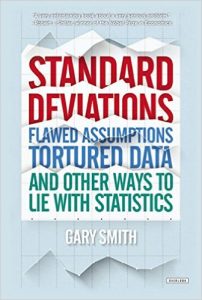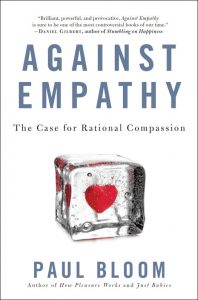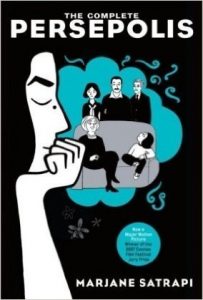Gary Smith is my kind of curmudgeon. This book is basically a long set of essays on how people screw up their stats. Sometimes this is particular complaints about particular (often famous) scholars. Sometimes it’s discussion of common  conceptual errors. I especially enjoy how pretty much nobody is spared, from politicians to famous scholars, to beloved intellectuals like Steve Levitt of “Freakonomics” fame.
conceptual errors. I especially enjoy how pretty much nobody is spared, from politicians to famous scholars, to beloved intellectuals like Steve Levitt of “Freakonomics” fame.
If you’re into turning a skeptical eye on everything, or if you want to learn how to think more clearly about science, the news, politics, economics, and anywhere else people are likely to abuse stats, this is a a great book for you.

 The author makes a compelling that the role of these drugs (which were used en masse during the Battle of France) has been underestimated. Similarly, the fact that Hitler had a personal physician who prescribed him all manner of drugs, up to and including speedballs, may have also been overlooked as an explanation of erratic behavior.
The author makes a compelling that the role of these drugs (which were used en masse during the Battle of France) has been underestimated. Similarly, the fact that Hitler had a personal physician who prescribed him all manner of drugs, up to and including speedballs, may have also been overlooked as an explanation of erratic behavior. elements that make Dick amazing are there, but… somehow it just doesn’t seem to coalesce. Almost all Dick novels follow a pattern, in which a number of small stories are set up in a very strange future reality. The stories are advanced as they bounce against each other, ultimately coming to some sort of resolution. When this works (as in Dr. Bloodmoney, Do Androids Dream of Electric Sheep?, and The Man in the High Castle) it’s magnificent. It’s that part of Mozart’s 40th where suddenly all the melodies intertwine and change.
elements that make Dick amazing are there, but… somehow it just doesn’t seem to coalesce. Almost all Dick novels follow a pattern, in which a number of small stories are set up in a very strange future reality. The stories are advanced as they bounce against each other, ultimately coming to some sort of resolution. When this works (as in Dr. Bloodmoney, Do Androids Dream of Electric Sheep?, and The Man in the High Castle) it’s magnificent. It’s that part of Mozart’s 40th where suddenly all the melodies intertwine and change. reminds me “In Defense of Flogging” by Moskos, in the sense that the author isn’t exactly in favor the what the title claims, but nevertheless argues that our current alternative is even worse.
reminds me “In Defense of Flogging” by Moskos, in the sense that the author isn’t exactly in favor the what the title claims, but nevertheless argues that our current alternative is even worse. science I often find it a bit lighter on science than I’d like. As with many writers who fall somewhere between journalism and pop science, you often get a long story about visiting a person and place instead of a detailed description of the science at hand.
science I often find it a bit lighter on science than I’d like. As with many writers who fall somewhere between journalism and pop science, you often get a long story about visiting a person and place instead of a detailed description of the science at hand. Revolution as the daughter of secular leftist parents. It’s not the most beautiful of graphic novels, but the art hits the right tone. Although I enjoyed it, and recommend it if you’re interested in the history, I have trouble putting it on the same pedestal as books like Fun House by Bechdel. Bechdel’s book both recounts stories from her life and weaves them into a sort of visual poem. Satrapi’s stories are fascinating (viscerally, they are more interesting than Bechdel’s), but they don’t really come together as something.
Revolution as the daughter of secular leftist parents. It’s not the most beautiful of graphic novels, but the art hits the right tone. Although I enjoyed it, and recommend it if you’re interested in the history, I have trouble putting it on the same pedestal as books like Fun House by Bechdel. Bechdel’s book both recounts stories from her life and weaves them into a sort of visual poem. Satrapi’s stories are fascinating (viscerally, they are more interesting than Bechdel’s), but they don’t really come together as something. interesting of all, Wood argues that the West has often misunderstood Islamic State members, by either claiming that they’re purely the product of our own influence, or that they are not truly a religion, or that the people in charge are mere power seekers. To oversimplify a bit, Wood’s big point is that these people are best understood as religious people with a great deal of conviction, who believe in a fundamentalist interpretation of the Qu’ran, that leads to their awful behavior. Particularly memorable for me was a part where he mentions a conservative American scholar who believes we fail to understand ISIS because most of us in the secular West no longer understand the basic ideological framework that would lead someone to endure war and privation for religious beliefs.
interesting of all, Wood argues that the West has often misunderstood Islamic State members, by either claiming that they’re purely the product of our own influence, or that they are not truly a religion, or that the people in charge are mere power seekers. To oversimplify a bit, Wood’s big point is that these people are best understood as religious people with a great deal of conviction, who believe in a fundamentalist interpretation of the Qu’ran, that leads to their awful behavior. Particularly memorable for me was a part where he mentions a conservative American scholar who believes we fail to understand ISIS because most of us in the secular West no longer understand the basic ideological framework that would lead someone to endure war and privation for religious beliefs. fascinating biology along with a lot of the weird anecdotes you might imagine a biologist who studies venom might have.
fascinating biology along with a lot of the weird anecdotes you might imagine a biologist who studies venom might have. bit more technical, but this book really is concise and focused mostly on basic historical facts. If you don’t know anything about the history of computing, this is a great place to start. If you already know the basic deal, I’d skip it.
bit more technical, but this book really is concise and focused mostly on basic historical facts. If you don’t know anything about the history of computing, this is a great place to start. If you already know the basic deal, I’d skip it. to call a flaw because the author is quite aware of it) is that in the book’s exuberance for the specialness of English, it can get quite a bit too teleological. Just about any claim in English’s favor could be easily explained as survivor bias.
to call a flaw because the author is quite aware of it) is that in the book’s exuberance for the specialness of English, it can get quite a bit too teleological. Just about any claim in English’s favor could be easily explained as survivor bias.